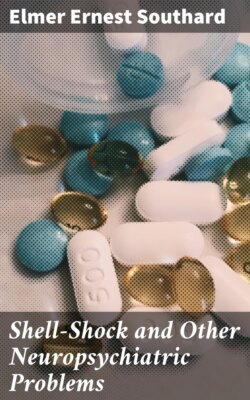Читать книгу Shell-Shock and Other Neuropsychiatric Problems - Elmer Ernest Southard - Страница 52
На сайте Литреса книга снята с продажи.
ОглавлениеDiagnostic dispute between regimental surgeon and alienist.
Case 44. (Kastan, January, 1916.)
Julius Q. was sent on guard April 14, 1915, with orders to remain there. While on guard he made a noise and made a movement as if to take a knife from his pocket. Ordered to empty his pockets, he attacked the other guards. The witnesses said that he was drunk.
Upon examination, it appeared that he had recognized and called by name those present in the guardhouse, despite his supposed intoxication. There were red spots on the skin and a certain amount of analgesia. His powers of computation and reasoning were poor. He was unable to explain the meaning of a picture shown him. He maintained that he had an indomitable desire for drink. A diagnostic draught of alcohol yielded no reaction. Upon dismissal, he got drunk at once again, and had again to be imprisoned in a state of excitement. What the outcome in this case was is not stated by Kastan.
The previous history seems important. Julius Q. had been a state ward. He had escaped several times from the institution but had always to be brought back again because he could not be trained at home. He had once attacked a supervisor in the state institution with a knife. It seems that he had at this time been drunk, having been brought back drunk to the institution.
Two years before the war he had been taken to the Breslau Hospital for the Insane on account of fits of insanity. In 1913 he had been a patient in Wuhlgarten on similar grounds. The diagnosis there had been epileptoid degeneration, psychopathic constitution, imbecility, or epilepsy(?). He had been convicted of crimes a number of times and put to labor. He had been given to cruelty in childhood.
Despite this, he was declared perfectly healthy in mind and body by the regimental surgeon.
In 1914, Q. fell suddenly ill in prison (he was presumably in prison for a military offence), and smeared the cell with feces, saying that he was able to do that as he could pay for anything. He stared at the floor and failed to answer questions. He remarked, however, that he had frequently been convicted for breach of the peace and assault and battery, and he said his father had been a drunkard, and he acknowledged hallucinations to the extent of saying that he heard his name called when he was alone.
The story of this case warrants our inquiring why such a patient was kept in the army. He was kept there clearly on account of the report of the regimental surgeon, who could not have taken seriously the previous history of the case, or else thought the patient perfectly good cannon fodder.
The hypothesis of syphilis apparently need not be entertained. That of feeblemindedness is possibly the fundamental diagnosis, yet epilepsy was considered by the German diagnosticians, doubtless on account of the sudden violent attacks and breaches of peace on the part of the patient. There is clearly something behind mere alcoholism in the entire story of this state ward. On the whole, the periodicity of the attacks is equally consistent with the picture presented by numerous feeble-minded persons, and the institutions that had to deal with Q. regarded him rather as epileptoid. There seems to be evidence of actual intellectual defect. Accordingly it seems wiser to consider the case of Julius Q. one of feeblemindedness, possibly of the moron group. We should then consider the epileptoid features as part and parcel of the feeblemindedness. We should consider the intellectual defect a part of the process; and the uncontrollable impulse to drink, the sudden violent attacks, and the cruelty in childhood would then be regarded as merely symptomatic of the feeblemindedness. It seems clear that either mental tests by the regimental surgeon or an examination of the patient’s previous history would tend to exclude such a patient from the army.
